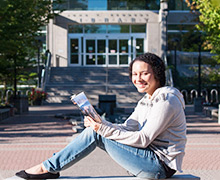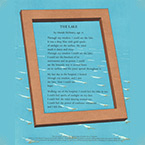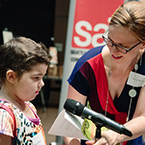Poetry’s Healing Power
Our writing programs use professional poets to help families and staff give voice to their experience, find strength and heal.

Writing helped Mariah McHenry (pictured on her college campus) find hope when she was recovering from a bone marrow transplant. One of her poems was a finalist in a Writers in the Schools competition, and she participated in a poetry reading at the Seattle Public Library's Central Library. “It helped me feel normal again,” she says. (Image courtesy of Eastern Washington University.)
Mariah McHenry was a high school senior who had her first boyfriend, had just made the varsity basketball team and was getting excited about college when she found out she needed a bone marrow transplant to cure a rare disease – called paroxysmal nocturnal hemoglobinuria – that was causing her red blood cells to break down.
“I felt really angry when the doctors told me I had to stay out of school for a year because the transplant would make my immune system weak,” Mariah remembers. “It interrupted all the things I loved to do.”
Mariah had her transplant in January 2014 and sailed through her recovery until an infection put her back in the hospital in March – and left her feeling even more isolated and powerless.
A visit from poet Sierra Nelson helped Mariah get some perspective. Nelson is part of a Seattle Children’s program that helps patients put their experiences into words and give voice to their emotions. With Nelson’s help, Mariah crafted a poem that described the lake – Lake Washington – outside her hospital window. As Mariah wrote, she started to view the lake as a symbol of everything she would enjoy when she got back to normal life.
“Writing with Sierra helped me see things differently – the poem became all about finding hope in the world,” Mariah says.

Stress and trauma relief
For children, being ill can mean enduring chronic pain, being separated from friends and even facing questions about mortality. A child’s illness can also be overwhelming for parents, who must care for their child, make critical medical decisions and stay afloat at their jobs and at home, often while coming face-to-face with the possibility of losing their son or daughter.
“These families’ lives have been upended. The kids are scared and it makes no sense to them why this happened. Many parents end up anxious and depressed, and experience post-traumatic stress disorder,” says Karen Gordon, a social worker on our Palliative Care Program team, which cares for children with life-threatening health problems.
In 2009, the team helped Seattle Children’s create a poetry and journaling program to help their patients cope. A partnership with Writers in the Schools (WITS) is central to this program. WITS sends professional writers, like Nelson, to schools and hospitals to spark kids’ interest in reading and writing and help them express their feelings.
“We saw pretty quickly that putting thoughts on paper helped patients process their experience and gave them an outlet to be playful, express their hopes and dreams and remember that they’re not defined by their illness,” says Julie Arguez, a Palliative Care Team social worker.
“Putting thoughts on paper gives patients an outlet to be playful, express their hopes and dreams and remember that they’re not defined by their illness.”
Restoring confidence

Sierra Nelson adjusts the microphone as Maria Moore gets ready to read her poem “Green” at the Writers in the Schools (WITS) annual student reading at the Seattle Public Library's Central Library.

Stan Matsui (right) is a regular at the monthly writing workshops Elizabeth Austen leads to help staff recharge. The workshops are made possible by generous support from the Kenneth and Marleen Alhadeff Charitable Foundation.
The success of Palliative Care’s writing program success inspired Seattle Children’s to bring poetry and journaling to more patients. Another WITS writer, Ann Teplick, now makes weekly visits to the hospital’s schoolroom for patients and to patients receiving psychiatric care. Teplick reads poems to the children and gives them writing prompts that make it easy to start their own poems.
Sometimes patients write about their health problems and how they want to return to normal childhood. But they often write about things totally unrelated to illness.
“One exercise asks the kids to give advice and a lot of them write about something practical, like what to do when you lose your dog,” says Brian Ross, who directs our education programs. “It helps kids stay connected to things they’re good at. That restores their confidence that they can move forward and get out of the hospital.”
Helping staff recharge
Around the time that Palliative Care launched its writing program, chaplain Martha Dimmers and her team noticed more and more hospital staff confiding that they felt burned out.
“The people who work at Seattle Children’s are so busy and so committed to helping families that they often don’t take time to process the stress and grief that goes along with their jobs,” says Dimmers, whose team offers emotional and spiritual support to patients, families and staff. “They can become emotionally exhausted and that affects everything from their personal lives to how well they do their jobs.”
In 2009, Dimmers and her colleagues teamed up with Elizabeth Austen – a renowned poet who is also on our marketing team – to launch reflective writing workshops to help staff replenish themselves. Twice a month, Austen leads 30-minute sessions where Seattle Children’s staff members listen to poetry and write journal entries. The workshops attract everyone from physicians to social workers to administrative staff. Austen also holds monthly sessions with the Palliative Care team.
“Journaling opens you up to dealing with stresses like not being sure about a diagnosis or being frustrated that you can’t help families more,” says Dr. James Metz, who regularly attends Austen’s workshops. “It helps me recharge so I can be at my best for patients.”
Metz found the sessions so helpful that he invited Austen to lead workshops with University of Washington medical students getting ready for their residencies. Austen started one session by reading poems about mistakes.
“We wanted to help them see that while they have a tremendous responsibility as physicians, they’re also human and we can give them tools to be resilient when things don’t go as well as they hope,” Austen says.
Support for parents
Last year, Arguez and Gordon received a one-year grant to launch the nation’s first journaling program for parents of children who are seriously ill and might be near the end of life.
This enabled Nelson to work with parents like Rebekah and Jason Uhtoff, whose 11-year-old son, Gabe, has a severe form of spina bifida and is unable to walk or talk. When blood vessels burst inside Gabe’s body and left him in critical condition, Nelson helped the Uhtoffs write about their concerns and hopes for Gabe – such as how they wanted to get better medical equipment at home to spare him from long hospital stays.
The writing sessions also helped the Uhtoffs step back and see how much they needed each other.
“You can get so focused on your child’s crisis that you forget other people rely on you, too,” Rebekah Uhtoff says. “Journaling helped me and Jason hear each other’s hopes and concerns, and see that we needed to give each other more support. That makes things better for us and it means we can help Gabe better.”
Arguez and Gordon had to put the program on hiatus after its funding ended in August. They are looking for funds to restart the program and extend its impact by potentially creating a blog and a printed anthology of parent writing.
“Parents touch on the same themes when they write, like grieving the loss of the life they imagined for their child, and how to be strong when you don’t know what’s going to happen,” Arguez says. “We think that reading about other parents’ experiences could give them solace as they head down what can be a very difficult road.”
Published in Connection magazine, Winter 2016